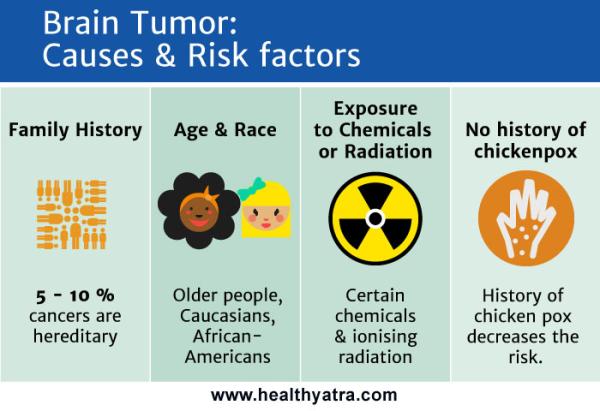| The precise causes of brain tumors remain largely unknown, but a complex interplay of genetic and environmental factors is implicated. Genetic predispositions, including inherited gene mutations and acquired somatic mutations, increase the risk of developing certain types of brain tumors. Environmental exposures, such as ionizing radiation, certain viruses, and potentially some chemicals, may also play a role by damaging DNA and triggering uncontrolled cell growth. While some risk factors are identifiable, many cases arise without any clear cause, highlighting the intricate and incompletely understood nature of brain tumor development. The causes of brain tumors are complex and not fully understood, but research has identified several contributing factors:
Genetic Factors: - Inherited Genes: Some brain tumors are linked to inherited genetic mutations, significantly increasing the risk. These mutations can affect genes involved in cell growth and repair, leading to uncontrolled cell division and tumor formation. Examples include Li-Fraumeni syndrome, neurofibromatosis, and tuberous sclerosis complex.
- Acquired Genetic Changes (Somatic Mutations): These are genetic changes that occur in individual cells during a person's lifetime and are not inherited. They are far more common than inherited mutations and are often implicated in sporadic brain tumors. These mutations can arise spontaneously or be triggered by environmental factors.
Environmental Factors: - Ionizing Radiation: Exposure to high doses of ionizing radiation, such as from radiation therapy for other cancers or nuclear accidents, is a known risk factor for brain tumors. Even relatively low doses over a long period may increase the risk.
- Certain Viruses: While not definitively proven for most brain tumors, some research suggests a possible link between certain viruses and the development of some types of brain tumors. Examples include Epstein-Barr virus and human immunodeficiency virus (HIV).
- Chemical Exposure: Exposure to certain chemicals, though not definitively linked to many brain tumors, is an area of ongoing research. Some studies suggest a potential correlation with specific occupations or exposures.
Other Factors: - Age: The risk of brain tumors increases with age, particularly for certain types.
- Sex: Some brain tumors are more common in men, while others are more frequent in women.
- Ethnicity: Certain ethnic backgrounds may have a slightly higher or lower risk for specific brain tumor types.
- Family History: While not directly causal, a family history of brain tumors can slightly increase the risk, even in the absence of identified inherited genes. This may hint at unidentified genetic or environmental factors.
It's crucial to understand: - Many brain tumors are sporadic: Meaning they occur without a clear identifiable cause. The majority of brain tumors fall into this category.
- Research is ongoing: Scientists are actively working to uncover more precise causes of brain tumors, to improve prevention and treatment strategies. Understanding the complex interplay of genetic and environmental factors is a key focus.
This information is for general knowledge and does not constitute medical advice. If you have concerns about brain tumors, consult a healthcare professional for personalized guidance and evaluation. 
Tags: Brain Tumors Cancer Awareness Causes Of Cancer Genetic Factors Health Science Healthcare Research Medical Research Occupational Health Viral Exposure  
|  1,507
1,507  0
0  0
0  3350
3350 